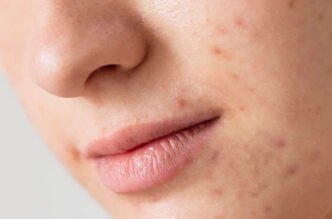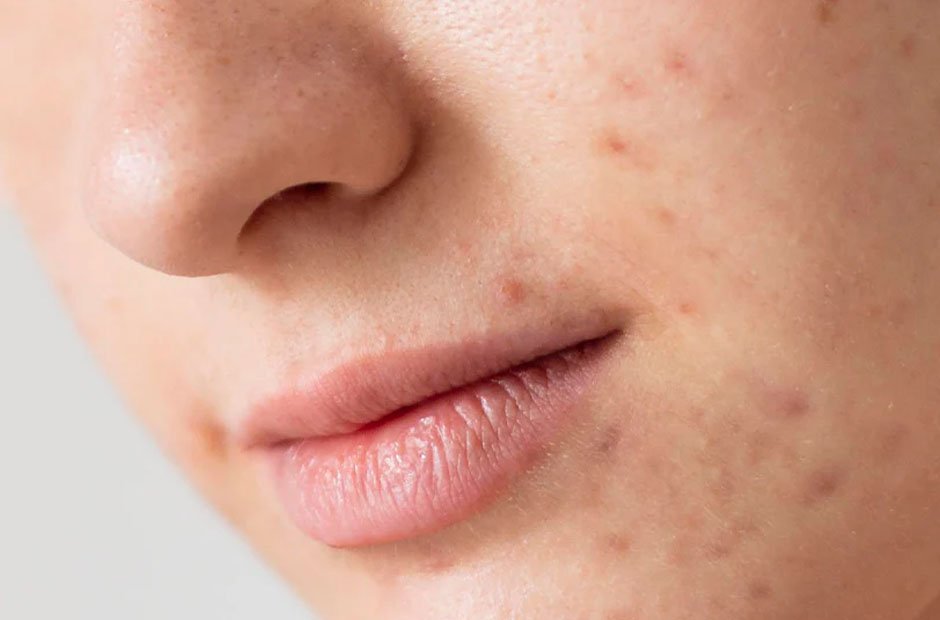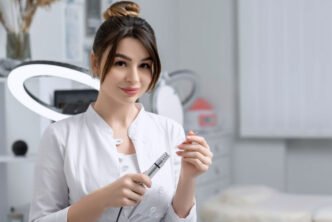Finding the correct balance between acne treatment and skin care for sensitive skin can be difficult. Traditional acne treatments might hurt sensitive skin. Hard chemicals, active substances, and textures can irritate, redden, and worsen acne. For sensitive skin, moderate, effective acne treatments that protect skin health are crucial.
Is Sensitive Skin?
Sensitive skin reacts to products and environmental stimuli with redness, irritation, stinging, and burning. A thin skin barrier makes this skin type more susceptible to external irritants, including harsh acne medicines. Sensitive skin requires careful skincare, especially for acne. Gentle acne treatments that don’t damage skin are essential.
Harsh skincare chemicals, severe temperatures, pollution, allergies, and stress can cause sensitive skin. Due to this sensitivity, acne treatments for normal skin might irritate or dry out. To manage breakouts without causing more problems, sensitive skin acne treatment treatments are essential.
A Complex Relationship Between Acne and Sensitive Skin
Hormonal changes, genetics, lifestyle, and diet cause acne. During puberty and stress, hormones can cause the sebaceous glands to generate extra oil, blocking pores and fostering acne-causing bacteria. Genetics also determine acne and sensitive skin susceptibility. While these factors are mostly out of control, skincare and lifestyle decisions can greatly affect acne severity.
Benzoyl peroxide, salicylic acid, and alcohol-based acne treatments can irritate or dry up delicate skin. These treatments typically remove the skin of its natural oils, disturbing its delicate balance and sometimes aggravating inflammation or redness. Thus, sensitive skinned persons need acne solutions that are gentle but efficient without creating irritation.
Considerations for Sensitive Skin Acne Treatment
Consider acne treatment products for sensitive skin that nourish and protect the skin as well as fight acne. Benzoyl peroxide and salicylic acid, while effective acne treatments, can dry and irritate sensitive skin. Alcohol-based treatments can also dry the skin, increasing sensitivity.
Non-comedogenic, fragrance-free, and alcohol-free cosmetics are best for sensitive skin. Using calming substances like aloe vera, chamomile, or niacinamide helps reduce redness and irritation while treating acne. Niacinamide regulates sebum production and improves skin texture, making it ideal for acne and sensitive skin.
Hydrating substances like hyaluronic acid are essential. Hyaluronic acid is safe for sensitive skin. Instead, it moisturises acne-prone skin, which acne treatments dry out. Moisture keeps skin healthy and balanced, avoiding irritation and flare-ups.
Top Sensitive Skin Acne Treatments
Choose moderate, effective acne treatments for delicate skin. Start with sensitive skin cleansers. A gentle, non-drying cleanser can remove dirt, oil, and pollutants without drying out the skin. Hydrate and soothe with gentle foamy cleansers or micellar waters.
Choose acne treatments with gentle but effective components like tea tree oil, which is antibacterial and anti-inflammatory. Unlike harsher treatments, tea tree oil kills acne-causing germs without inflammation. Chamomile and calendula, plant-based compounds that soothe irritation and redness, are ideal for sensitive skin.
For sensitive skin, acne treatment must include moisturization. A lightweight, oil-free moisturiser helps keep skin hydrated without greasiness. Look for moisturisers with niacinamide or hyaluronic acid, which hydrate and soothe irritation.
Finally, stem cell or growth factor therapy for acne scars may work. Stem cell treatments boost skin healing, decreasing scarring and improving skin texture. These treatments are perfect for those who want to improve their skin without disrupting its delicate balance.
The Clear Skin Journey
Clear skin, especially sensitive skin, need patience, consistency, and a customised strategy. Remember that acne treatments work differently for everyone. Since choosing the proper solutions takes time, clearing skin typically requires trial and error. However, using moderate, non-irritating, and sensitive skin-specific products can prevent flare-ups and improve skin over time.
Self-care and not being too severe on oneself are also important. Acne is prevalent, so treat your skin gently during therapy. Acne can be managed and a balanced complexion maintained using sensitive skin acne treatment treatments.
Conclusion
Treating acne on sensitive skin demands considerable care. Traditional acne remedies often irritate or aggravate outbreaks. By utilising moderate, non-irritating products and focussing on skin health, acne can be managed without disrupting the skin’s delicate equilibrium. Patience, persistence, and self-care are essential to clear, healthy skin, and the correct acne treatment products can nourish sensitive skin while combating breakouts.








